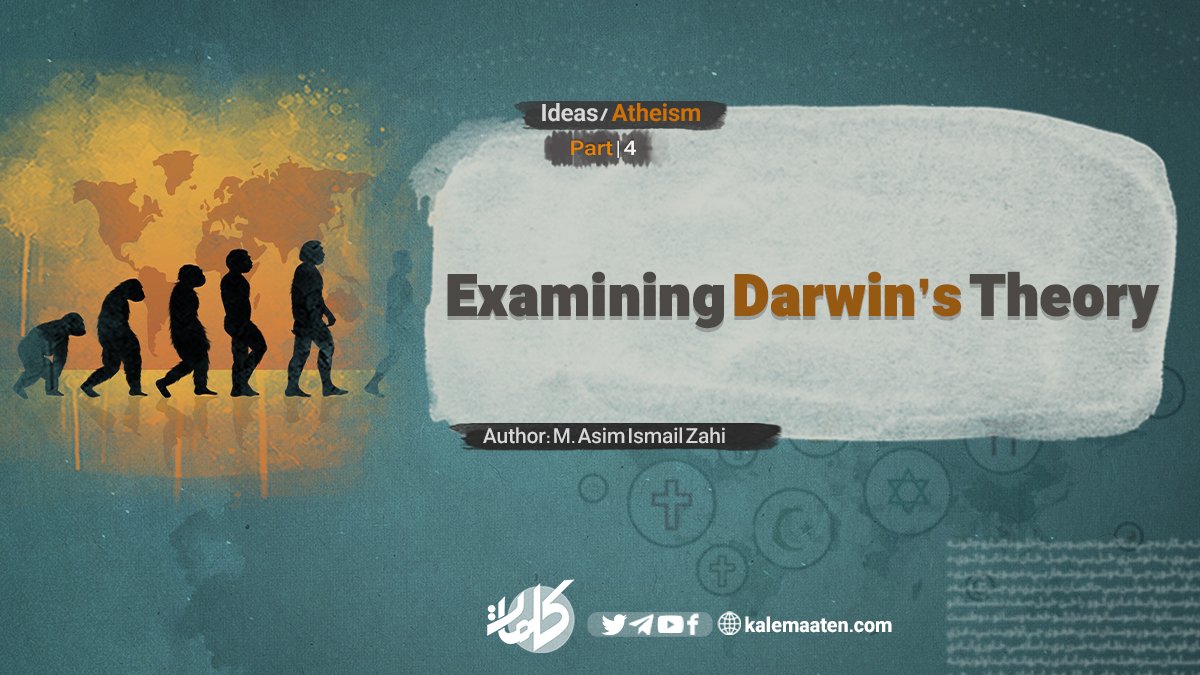
Author: M. Asim Ismail Zahi
Examining Darwin’s Theory (Part Four)
The Spiritual and Divine Dimension (Blowing the Spirit):
7. Allah Almighty directly created Adam from clay with His own power: “قَالَ يَا إِبْلِيسُ مَا مَنَعَكَ أَنْ تَسْجُدَ لِمَا خَلَقْتُ بِيَدَيَّ أَسْتَكْبَرْتَ أَمْ كُنْتَ مِنَ الْعَالِينَ”; He said, O Iblis, what prevented you from prostrating to what I created with My hands? Were you arrogant, or were you among the haughty? “خَلَقْتُ بِيَدَيَّ” indicates that He created Adam directly and without any intermediary, such as parents, with His own power. The term “hand” here is a metaphor for power.
إِذْ قَالَ رَبُّكَ لِلْمَلَائِكَةِ إِنِّي خَالِقٌ بَشَرًا مِّن طِينٍ “When your Lord said to the angels, ‘Indeed, I am creating a human being from clay.'”
“قَالَ مَا مَنَعَكَ أَلَّا تَسْجُدَ إِذْ أَمَرْتُكَ قَالَ أَنَا خَيْرٌ مِّنْهُ خَلَقْتَنِي مِن نَّارٍ وَخَلَقْتَهُ مِن طِينٍ”; “He said, what prevented you from prostrating when I commanded you?’ (Iblis) replied, ‘I am better than him; You created me from fire, and him from clay.'”
“وَإِذْ قُلْنَا لِلْمَلَائِكَةِ اسْجُدُوا لِآدَمَ فَسَجَدُوا إِلَّا إِبْلِيسَ قَالَ أَأَسْجُدُ لِمَنْ خَلَقْتَ طِينًا”; “And when We said to the angels, ‘Prostrate to Adam,’ they all prostrated except Iblis, who said, ‘Should I prostrate to one You created from clay?'”
Thus, the essence of human creation is from water and clay. The apparent meaning of the Qur’anic verses aligns with the independent creation of humanity. It is also evident from the wording that the verses about Adam’s creation revolve around independent creation, signifying that Allah created him from clay (ṭīn) and infused him with His spirit.
Moreover, the apparent meaning of these verses contradicts Darwin’s theory of evolution, which suggests that humans evolved from animals. Instead, the Qur’anic perspective highlights the unique origin of humans from clay and the divine spirit. This divine infusion sets humans apart from other living beings, granting them unique characteristics that elevate them above other creatures and enable them to achieve spiritual closeness to Allah.
Unlike other living beings, humans were endowed with a distinct nature from the very beginning, making them capable of divine communication and receiving Allah’s guidance. This divine mystery empowers humans to achieve spiritual perfection, a quality not shared by other creatures, which remain confined to their basic instincts.
Therefore, reconciling Darwinism’s principles of human evolution with the Qur’anic account of creation poses challenges unless one view the evolutionary concept within the framework of Qur’anic teachings. The Qur’an emphasizes that humans have a unique dual composition—body (clay) and spirit (divine). It is this divine element that defines humanity and distinguishes it from all other creations.
8. From the Qur’anic verses about the creation of Adam (peace be upon him) and humanity, it is evident that all human characteristics and independent responsibilities were bestowed simultaneously with creation.
In Fazyel al-Qur’an, it is stated: “Let us move on. The grand narrative of humanity, as presented in the Qur’anic progression, deserves detailed contemplation. The story of humanity highlights the unique nature of this creation called Insan (human). Humans possess a distinct creation that transcends their physical and structural composition. All Qur’anic verses about Adam’s creation and the emergence of the human race suggest that this being was granted all its characteristics and responsibilities at the time of its creation. Progress and development throughout human history stem from the cultivation of these traits and their enhancement, not from physical evolution, as Darwinism claims. There is no evidence in the Qur’an supporting the transformation of species culminating in humanity.”
9. Islam’s View on Humanity:
Islam regards humans as unique beings with distinct characteristics in biology, physiology, intellect, and spirit. While humans and animals share physical organs and systems, human features are organized in a superior manner. From the very beginning, humans’ fundamental desires and needs differ from those of animals.
Humans’ basic needs go beyond mere survival, including intellectual and spiritual aspirations. While animals focus on eating, drinking, shelter, and reproduction, humans pursue knowledge, willpower, freedom, and choice. These higher traits distinguish human identity and elevate humans to a superior status.
Humans possess essential attributes such as belief, intellectual freedom, willpower, and the ability to choose, which define their humanity. These traits grant humans a unique status, setting them apart from all other creatures.
Continues…


